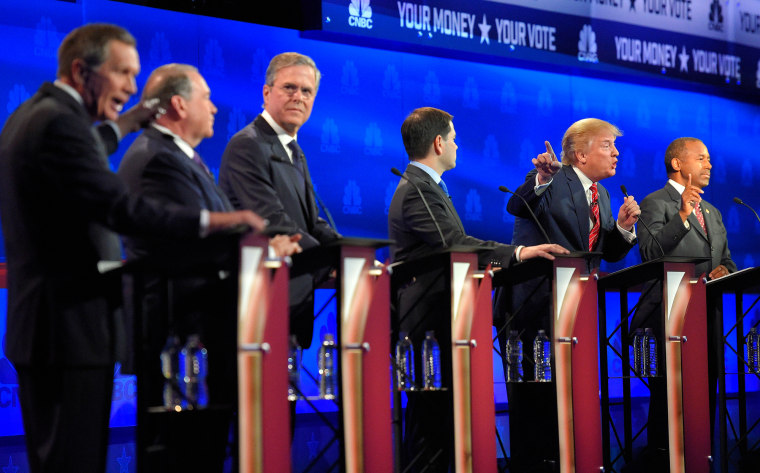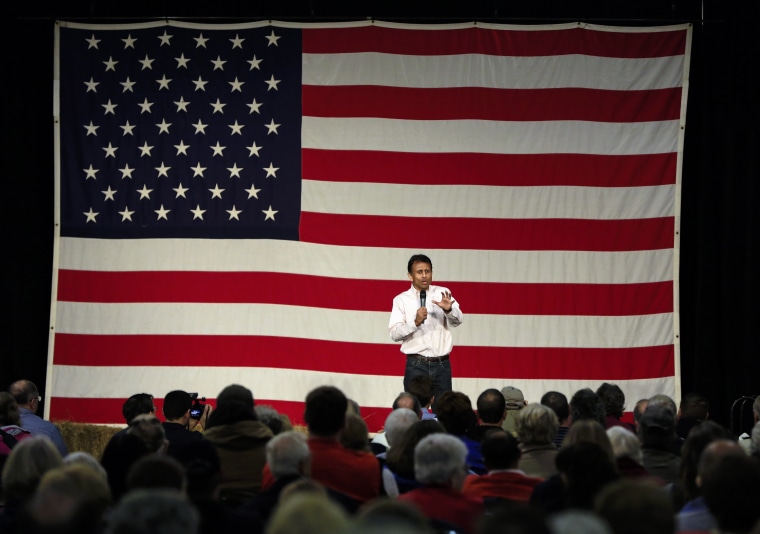In an election year where voters' anger has upended conventional wisdom, the campaigns themselves are motivated by a festering discontent over the GOP primary debate process.
One Republican campaign adviser summed it up this way: While there are "15 different campaigns and countless egos," there is hope to find common ground and a "unifying voice."
That could come Sunday, when all but one campaign has agreed to meet in the Washington, D.C., area, to discuss wresting control of the debate process from the Republican National Committee. One source told NBC News that "only the Cruz campaign has not confirmed."
Related: Poll: Carson and Trump Lead the GOP Field
"We've been in touch with the other campaigns," said Alex Conant, of Marco Rubio's campaign. But Rubio's team is not discussing the Sunday meeting publicly.
"We're glad to have a discussion about the debates formats, but Marco will be in Milwaukee," Conant added.
J. Hogan Gidley, adviser to Gov. Mike Huckabee, told NBC News that the campaigns are having direct conversations with each other as to "how we can avoid another disaster" where the moderators become the story. That was the case following Wednesday night's debate hosted by CNBC, in which the candidates attacked the moderators for questions perceived to be biased.

"It's not just a disservice to the candidates — it's a disservice to the voters," Gidley said of the line of questioning. "They are not getting substance and facts. They are getting ridiculous and biased questions that don't further debate."
Campaign representatives are expected to attend in person Sunday with each campaign permitted two attendees.
"The RNC has negotiated with networks and things have gotten progressively worse," said one official who declined to be named. "Three strikes and you're out."
Advisers raised concerns that biases within the RNC may favor certain candidates, including Jeb Bush, whose poll numbers have been floundering, and Scott Walker, before the Wisconsin governor dropped out of the race in September.
"Everything is on the table for discussion," Lindsey Graham campaign manager Christian Ferry told NBC News of the meeting.
"This is not something people would expect from rival campaigns," Ferry added, but said the campaigns converging is a way to bring "generations of campaign experience together and put that to work."
Graham has been a standout in the so-called undercard debates, which occur before the prime-time showdowns with the top-tier candidates, and his team is pushing for a rules change to get Graham on the main stage.
"I don't know that we can reach agreement on the specificity," Gidley, of Huckabee's campaign, said. "I do think we can reach consensus on the premise. This kind of foolishness has to stop."
"At the end of the day, we want to have a vibrant debate focused on policy — not personal attacks," Conant added.
Campaign officials say their anger is directed at both the party heads and media.
"We are getting screwed over by the RNC and the press, and we're not going to take it anymore. We are taking matters into our own hands," said one adviser who asked not to be named.
Advisers say outrage from donors pushed RNC Chairman Reince Priebus to speak out after the CNBC debate. One campaign official said of Priebus' control over the events: "I think he's still trying to win 2012."
Bobby Jindal adviser Gail Gitcho said that "everybody is unhappy, from the top with (Donald) Trump and (Ben) Carson to the bottom with Jindal and Graham."

Related: RNC Suspends NBC News, Telemundo as Debate Partners
There remains frustration about the debates' format, time distribution, qualification criteria, site locations and getting rules in advance. But there are also concerns about logistics and facilities. One example: green rooms.
Some candidates claim they have been given no space at all, or shown to lesser spaces — even a bathroom as a "hold" room, making last-minute preparation uncomfortable.
The trouble extends to the stage itself, including complaints about candidates being unable to hear one another clearly through speakers attached to their lecterns. That, campaigns say, affects candidates' ability to jump in and seize a moment in the conversation.
"It's not just a disservice to the candidates. It's a disservice to the voters."
Campaign officials say they expect tough questions but have been disappointed, at times, by tone. Crowded stages have not permitted sufficient follow-ups, and they say that has turned the competition into a win-by-outburst contest.
According to multiple campaigns, they will consider many ideas during Sunday's meeting, including multiple debates with smaller panels of candidates, perhaps randomly selected or by criteria not limited to poll ranking.
Some campaigns say early state polling — and not just national rankings — should be taken into account, too.
One official described how unusual it is for campaigns to join forces. "I've never worked so closely with someone I am trying to beat," the official said. "Everybody has got their own agenda and they should because we are competing against each other."
